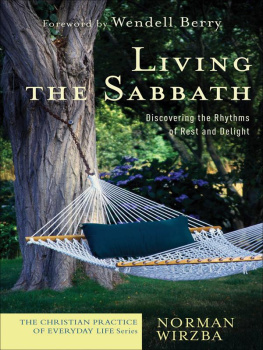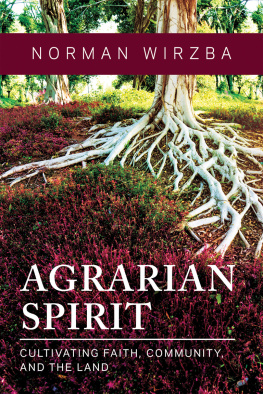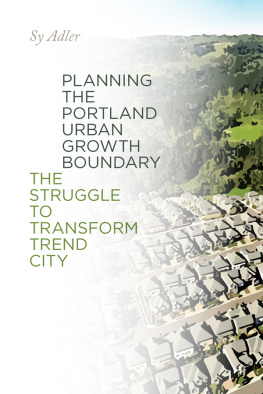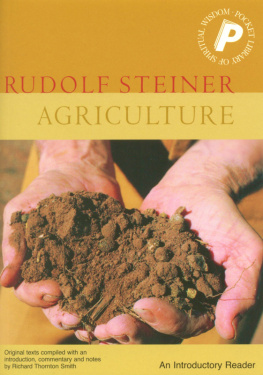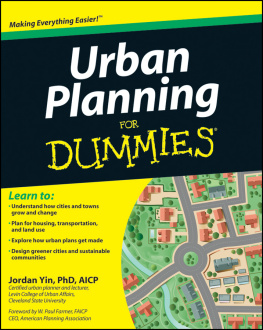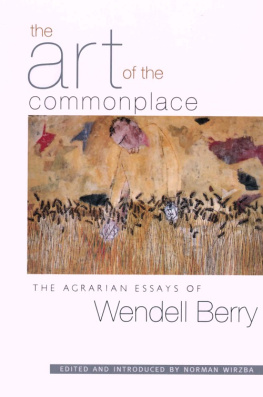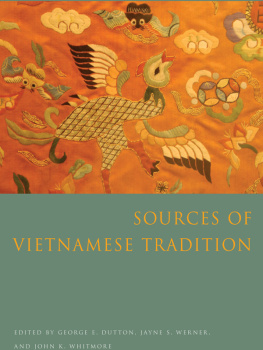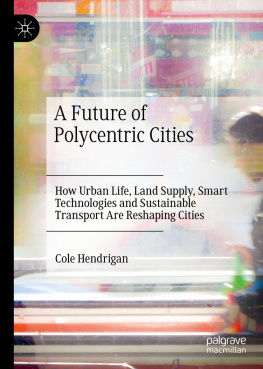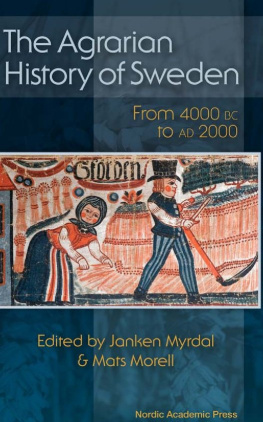The Essential Agrarian Reader

The Essential
Agrarian Reader
The Future of Culture,
Community, and the Land

EDITED BY
NORMAN WIRZBA

Publication of this volume was made possible in part by a grant
from the National Endowment for the Humanities.
Copyright 2003 by The University Press of Kentucky
Scholarly publisher for the Commonwealth,
serving Bellarmine University, Berea College, Centre College of Kentucky, Eastern Kentucky University, The Filson Historical Society, Georgetown College, Kentucky Historical Society, Kentucky State University, Morehead State University, Murray State University, Northern Kentucky University, Transylvania University, University of Kentucky, University of Louisville, and Western Kentucky University. All rights reserved.
Editorial and Sales Offices: The University Press of Kentucky
663 South Limestone Street, Lexington, Kentucky 40508-4008
Photography: Cover: Terraced Plowing, Saline County, Kansas, September 1990, Terry Evans; Frontispiece and page 99 Gregory Conniff; pages 21 and 189, Nina Danforth.
07 06 05 04 03 5 4 3 2 1
Library of Congress Cataloging-in-Publication Data
The essential agrarian reader : the future of culture, community, and
the land / edited by Norman Wirzba.
p. cm.
Includes bibliographical references and index.
ISBN 0-8131-2285-6 (Hardcover : alk. paper)
1. AgricultureEconomic aspects. 2. AgricultureEnvironmental aspects. 3. AgricultureSocial aspects. 4. Human ecology. 5. AgricultureMoral and ethical aspects. I. Wirzba, Norman.
HD1433.E87 2003
338.1dc21 2003008808
This book is printed on acid-free recycled paper meeting the requirements of the
American National Standard for Permanence in Paper for Printed Library Materials.

Manufactured in the United States of America.

| Member of the Association of American University Presses |
For Wendell Berry
mentor and friend
Contents
Barbara Kingsolver
Norman Wirzba
Wendell Berry
Brian Donahue
Maurice Telleen
Herman E. Daly
Norman Wirzba
Frederick Kirschenmann
Vandana Shiva
Wes Jackson
Gene Logsdon
David W. Orr
Benjamin E. Northrup and Benjamin J. Bruxvoort Lipscomb
Susan Witt
Hank Graddy
Eric T. Freyfogle
Wendell Berry
Foreword
Barbara Kingsolver
Sometime around my fortieth birthday I began an earnest study of agriculture. I worked quietly on this project, speaking of my new interest to almost no one because of what they might think. Specifically, they might think I was out of my mind.
Why? Because at this moment in history its considered smart to get out of agriculture. And because I was already embarked on a career as a writer, doing work that many people might consider intellectual and therefore superior to anything involving the risk of dirty fingernails. Also, as a woman in my early forties, I conformed to no right-minded picture of an apprentice farmer. And finally, with some chagrin Ill admit that I grew up among farmers and spent the first decades of my life plotting my escape from a place that seemed to offer me almost no potential for economic, intellectual, or spiritual satisfaction.
It took nigh onto half a lifetime before the valuables Id casually left behind turned up in the lost and found.
The truth, though, is that Id kept some of that treasure jingling in my pockets all along: Id maintained an interest in gardening, always, dragging it with me wherever I went, even into a city backyard where a neighbor who worked the night shift insisted that her numerous nocturnal cats had every right to use my raised vegetable beds for their litter box. (I retaliated, in my way, by getting a rooster who indulged his right to use the hour of 6 A.M. for his personal compunctions.) In graduate school I studied ecology and evolutionary biology, but the complex mathematical models of predator-prey cycles only made sense to me when I converted them in my mind to farmstead analogieseven though, in those days, the Ecology Department and the College of Agriculture werent on speaking terms. In my twenties, when I was trying hard to reinvent myself as a person without a Kentucky accent, I often found myself nevertheless the lone argumentative voice in social circles where farmers were lumped with political troglodytes and devotees of All-Star wrestling. Once in the early eighties, when cigarette smoking had newly and drastically fallen from fashion, I stood in someones kitchen at a party and listened to something like a Greek Chorus chanting out the reasons why tobacco should be eliminated from the face of the earth, like smallpox. Some wild tug on my heart made me blurt out: But what about the tobacco farmers?
Why, someone asked, glaring, should I care about tobacco farmers?
I was dumbstruck. I couldnt form the words to answer: yes, it is carcinogenic, and generally grown with too many inputs, but tobacco is the last big commodity in America thats still mostly grown on family farms, in an economy that wont let these farmers shift to another crop. If it goes extinct, so do they.
I couldnt speak because my mind was flooded with memory, pictures, scents, secret thrills. Childhood afternoons spent reading Louisa May Alcott in a barn loft suffused with the sweet scent of aged burley. The bright, warm days in late spring and early fall when school was functionally closed because whole extended families were drafted to the cooperative work of setting, cutting, stripping, or hanging tobacco. The incalculable fellowship measured out in funerals, family reunions, even bad storms or late-night calvings. The hard-muscled pride of showing I could finally throw a bale of hay onto the truckbed myself. (The year before, when I was eleven, Id had the less honorable job of driving the truck.) The satisfaction of walking across the stage at high school graduation in a county where my name and my relationship to the land were both common knowledge.
But when pressed, that evening in the kitchen, I didnt try to defend the poor tobacco farmer. As if the deck were not already stacked against his little family enterprise, he was now tarred with the brush of evil along with the companies that bought his product, amplified its toxicity, and attempted to sell it to children. In most cases its just the more ordinary difficulty of the small family enterprise failing to measure up to the requisite standards of profitability and efficiency. And in every case, the rational arguments I might frame in its favor will carry no weight without the attendant silk purse full of memories and sighs and songs of what family farming is worth. Those values are an old currency now, accepted as legal tender almost nowhere.
Next page

